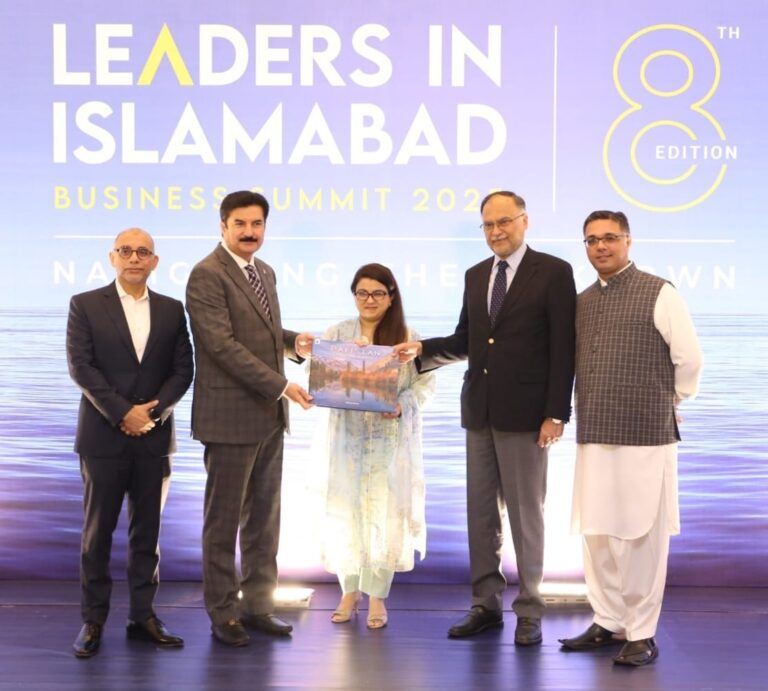Day 1 ofthe 8th Edition of Pakistan’s biggest corporate event, LEADERS IN ISLAMABAD BUSINESS SUMMIT (LIIBS), commenced at a local hotel. Under the theme Navigating the Unknown, the Summit convened a bespoke gathering of leaders from both the public and the private sector, who confronted the critical challenges of rapidly evolving ecosystems and forged pathways toward powerful solutions.
Muhammad Azfar Ahsan, Founder & Chairman, Nutshell Group & Pakistan’s former Minister for Investment, opened the day with a compelling welcome address highlighting the dual challenge of unprecedented economic and environmental uncertainty and way forward for the desired transformation. He stated, “National prosperity hinges on pioneering sustainable solutions. All ecosystems, whether natural or that of workspaces, need reframing of ecological and financial understanding of indigenous resourcing including that of overseas Pakistanis, as cornerstones of Pakistan’s future economic competitiveness.” Amir Shehzad, Chairman, Unity Foods Limited, and co-host of the Summit opened his welcoming keynote with a spotlight on evolving trade routes and ticking climate clock for Pakistan to revolutionize its approach. “At today’s global crossroads, Pakistan’s defining journey requires political stability with clear, consistent policies for investors, to chart the course forward. Climate change remains the greatest challenge, demanding unified public-private action rather than mere reaction. Our future depends on transforming vulnerability into opportunity through deliberate, panoramic thinking.”
The inaugural session comprised motivating addresses and significant takeaways; Shaza Fatima Khawaja, Federal Minister for IT & Telecom, said, “The digital transformation of Pakistan rests on three foundational pillars: connectivity that reaches every village and household, enablement that equips our citizens with necessary tools and infrastructure, and literacy that empowers them to harness technology’s full potential.” Aisha Humera Chaudhary, Secretary, Ministry of Climate Change & Environmental Coordination, stated, “Climate challenge requires transition into real commitments on the ground, inspiring local action. Our ministry is committed to action-driven climate policy – cross-sector collaboration is our mandate.” Faisal Karim Kundi, Governor, Khyber Pakhtunkhwa, concluded, “Local action matters most – KPK is historically and potentially one of the richest lands. An empowered KPK is working to ensure that its unmatched potential becomes a resource for best regional connectivity for Pakistan. A gateway for the past will now be the bridge to the future.”
Senator Dr. Musadik Malik, Federal Minister for Climate Change & Environmental Coordination, in his Keynote Address, stated, “We must reclaim and restore nature; move from ambition to execution – climate goals demand urgent fulfillment.”
In the session titled Forging the Future, three powerful conversations took place. Muhammad Ali, Federal Minister & Advisor to the Prime Minister on Privatization, was joined by Saquib Ahmad, Managing Director, SAP Pakistan, Iraq, Afghanistan & Bahrain. Ali emphasized, “Pakistan’s potential remains untapped due to the disconnect between opportunity and investment. With government footprint exceeding private sector involvement, we lack the accountability that comes from having skin in the game. The solution is clear: we must meaningfully engage the private sector to bridge this systemic gap.” Saquib added, “Data-driven governance is key to sustainability – SAP is ready to partner with Pakistan on this transformation.”
Dr. Ishrat Husain, N.I., H.I., Author, Economist, former Federal Minister & Governor, State Bank of Pakistan, shared, “Tariff escalation and trade war, accompanied by the paralysis of the World Trade Organization, and the dissolution of the USAID, have created an atmosphere where developing countries are striving to find their feet on the ground.”
In a conversation moderated by Mosharraf Zaidi, Founder, Tabadlab, while speaking on Forging the Future, Gen Zubair Mahmood Hayat, N. I., Chairman Joint Chiefs of Staff Committee (2016-2019), emphasized on the importance of AI and data centers. “Pakistan must build quality AI labs and educate their youth with the right knowledge. Individuals fade away but systems and institutions last longer.” Justice Ayesha Malik, Judge, Supreme Court of Pakistan, emphasizing on inclusion, said, “When it comes to law-making, what we are missing is a narrative. We must include the voices and stories of women to give them justice.”
Amongst prominent keynotes, Yousaf Hussain, President, Overseas Investors Chamber of Commerce & Industry (OICCI), shared, “Transforming uncertainty into advantage is imperative for Pakistan. True navigation requires genuine collaboration across sectors. Our goal must shift from mere survival to performance excellence.” Aamir Ibrahim, CEO – Jazz, Chairman – Mobilink Bank & Group Executive Committee Member, VEON, added, “The connectivity gap will soon become our capability gap. The smartphone in our hand is the remote control to our lives.” Jimmy Nguyen, Founder & CEO, New Win Global and Senior Advisor, Prism Carbon Solutions LLC, stressed, “Build solutions, build bridges that cross valleys, build boats that take you across oceans, build beacons of light that take you through darkness. Then build solutions that will help you navigate the unknown.” Helen Brand, Global CEO, ACCA, remarked, “Environmental threats can be avoided by thinking that no one can do everything, but everyone can do something. We must advocate new ways to judge success.” H. E. Dr. Riina Kionka, European Union’s Ambassador to Pakistan, said, “The private sector can play a crucial role in decarbonizing the power systems and advancing bilateral trade, investment and innovation in line with the Paris agreement.”
The session Climate and Sustainability had Dr. Samuel Rizk, Resident Representative Pakistan, United Nations Development Programme stating, “Climate change impacts are inevitable – a matter of when, not if. Our focus must shift from recovery to preparedness and prevention. UNDP is focused on inclusive climate solutions – our goal is to leave no one behind.” Maya Inayat Ismail, Chairperson, Sustainability Forum, HBL & Chairperson, HBL Microfinance Bank, alongside Sadia Dada, Chief Distribution & Marcomms Officer, K-Electric; Ayla Majid, Global President, ACCA and Founder & CEO, Planetive; and Umar Ahsan Khan, CEO, Dawlance, collectively reflected on business responsibility and regulatory reform to be in sync for best impact. To Maya’s statement, “Business practices have to align with the sustainability requirement of the day or else risk annihilation.” Sadia agreed by reaffirming, “Sustainability is no longer a CSR issue – it is a business imperative.” “Energy transition must prioritize accessibility and affordability,” added Umar. Sajeed Aslam, Partner, Spectreco LLC, USA, moderated and summed up the event with the need for discerning the urgent from the long term and roll out an action plan.
A Keynote Conversation, titled Future of Climate Finance, included Michael Blank of Prism Carbon Solutions, who said, “Carbon markets are real opportunities – under the Paris Agreement, Pakistan must reduce its carbon emissions by 15% by 2030.” Nadia Rehman, Member Climate Change & Food Security, Planning Commission of Pakistan, stated, “We are confronted with declining funding and will need increased focus on multilateral development funding.” Rizwan Ata, President & CEO, BankIslami Pakistan Limited, concluded, “Islamic finance has a unique opportunity to lead in ethical, sustainable investment.”
The final session, titled Changing Narratives, concluded the day with a fresh perspective on storytelling and engagement. Sharon Ezzeldin, Founder, HONOR, UK, said, “Youth voices are vital – if they are not at the table, we are missing the future.” Mahmoud Ashraf Hatem, Partner, Synerjies Middle East & Africa, emphasized, “Narratives shape behavior – climate storytelling must be hopeful, not just dire.” The session was moderated by Rida Qazi, Advisor on Special Initiatives & Investments, Senate of Pakistan, who said, “It is time to reframe climate as a story of opportunity – not sacrifice.”
The conference is set to resume on day two for delivering a strong message that it may be Navigating the Unknown, but Pakistan is prepared to lead with purpose, vision, and commitment across all levels of society.

